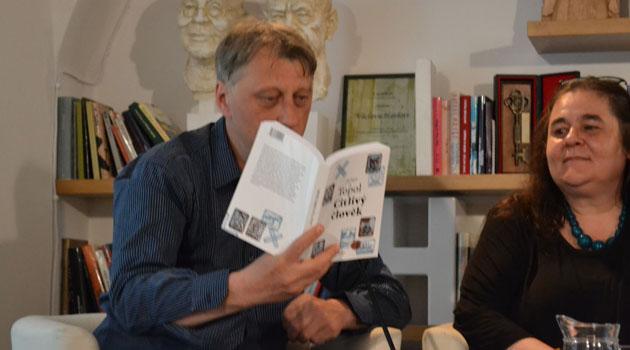Czech Republic: Discussion on Romani characters in literature part of the KHAMORO festival

As part of the KHAMORO World Roma Festival this week in Prague, yet another part of the “Gavoro” side program took place on Tuesday evening at the Václav Havel Library, dedicated to Romanes-language literature and other issues. Non-Romani and Romani authors Jáchym Topol, Kateřina Sidonová, Jana Hejkrlíková and Ilona Ferková debated the literary depiction of Romani characters.
The moderator of the debate, Romani Studies scholar Karolína Ryvolová, also designed the “Gavoro” concept, and the main face of the literary program during the festival has been Ilona Ferková, the niece of Romani author Andrej Giňa and a pioneer of literature written in the Romanes language in the Czech Republic. She began writing in Romanes after meeting the founder of the Romani Studies program at Charles University, Milena Hübschmannová, who mentored many Romani authors during her long career.
Ferková draws inspiration for her works from the actual life situations of Romani people today. Her most recent short story cycle is called “Kaštánek” (“Chestnut”), excerpts of which she read on Tuesday.
The protagonist of the cycle is a homeless Romani man nicknamed Kaštánek, who amuses the regulars of a small town gaming room by telling them stories. Czech autor Jáchym Topol incisively noted that Kaštánek could easily take his place alongside the Czech folk hero Hloupý Honza (“Stupid Johnny”), who was captured in literature by Czech novelist Božena Němcová, or the German folk trickster figure Till Eulenspiegel.
The six short stories are available free of charge for download on the website of the Kher publishing house, which specializes in electronically publishing Romanes-language literature. Topol, who in addition to writing journalism, poetry and prose is also the program director of the Václav Havel Library, said that Romani protagonists in Czech literature have constantly been in the grip of clichés dating from the Romantic era characterized by animality, passion, and spontaneity.
Topol admitted that he, too, had been unable to resist this temptation and in his most recent novel, “Citlivý člověk” (“A Sensitive Man”), a Romani character can be found that is based on such stereotypical foundations.Jana Hejkrlíková then pointed out that the demeanor of some Romani people today (especially Sinti people, in her view) might actually correspond to such romantic ideas, which is why she personally forgives Topol for drawing such a character.
The artist, author and translator Kateřina Sidonová then read an excerpt rom her own prose work, “Jakub”, in which she has attempted to de-ethnicize the character of a Romani man. The evening then closed with a new short story, “Ve vlaku” (“On the train”), by Jana Hejkrlíková, which she produced during a recent literary workshop for Romani women.
It is Romani women in particular who have been rolling up their proverbial sleeves recently and pushing Romanes-language literature into the future in the Czech Republic. The debaters all agreed that the speech of Romani characters in Romanes-language works is defined by a certain austerity arising from the authors’ need to capture the essence of their characters’ emotions, natures and relationships without giving unnecessary descriptions, which means the reader must necessarily fill in the context.
In part, however, this style is also influenced by the characteristics of Romanes language usage, which features just such ellipses, and before the last 50 years of written Romanes, the language was only used for face-to-face communication, which can also feature facial expressions and gestures to get the message across. The evening also featured a musical performance by Jana Hejkrlíková and her daughter (also named Jana), who were accompanied by Jiří Vidimský on guitar as they sang songs from the repertoire of the performer Radúza as well as traditional Romani folk songs.
